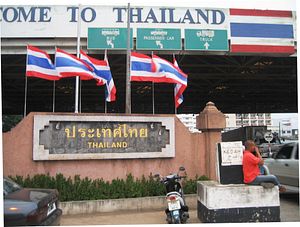Malaysia and Thailand have agreed to build a wall along their common border next year amid growing concerns about human trafficking.
The 640-kilometer Malaysia-Thailand border has long been the site of transnational crime, including the rampant smuggling of weapons, drugs, and people. In May, the issue sparked international furor following the discovery of mass graves in jungle camps in Malaysia near the border used by suspected smugglers of Rohingya Muslims from Myanmar (See: “Can Southeast Asia Tackle its Human Trafficking Problem?”). Similar graves were discovered in Thailand, which again received the lowest ranking in the U.S. annual trafficking report this year.
On Monday, Malaysian Armed Forces chief Zulkifeli Mohd. Zin announced that the two countries had reached a pact to build a border wall at the General Border Committee Meeting.
The idea of building structures to contain cross-border crime itself is not new to the two countries. Most recently, in 2013 both countries separately proposed constructing their own fences along the border for this purpose. As Zulkifeli pointed out, this new agreement is different because both nations would embark on the initiative together rather than individually, thereby increasing coordination and reducing costs.
“From the aspect of patrolling, Thailand will inspect their side and we, on ours. It is more practical and saves costs for both countries,” he said following the conclusion of the 32nd Malaysia-Thailand High Level Committee Meeting.
The agreement will now be referred to Malaysia’s parliament for the provision of funds. Sections along the border have reportedly already been identified for constructing the wall by both sides.
But while a border wall will no doubt be an imposing physical barrier to cross-border crime, it is unclear to what extent it will actually help reduce it. There are many other factors beyond physical infrastructure that contribute to the problem, most notably corruption. As I reported before, in June Malaysia’s police intelligence agency noted in a report compiled over ten years that a startling 80 percent of law enforcement officers in Malaysia’s borders were corrupt, with many of them directly involved in smuggling drugs, weapons, and people (See: “US Upgrades Malaysia in Trafficking Report: Boost for TPP, Blow to Rights?”).
Suffice to say it will take more than any physical wall to solve this aspect of the problem.
































